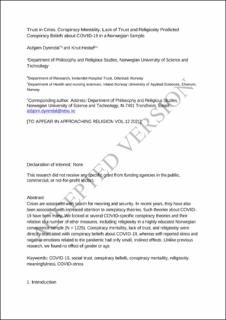| dc.contributor.author | Dyrendal, Asbjørn | |
| dc.contributor.author | Hestad, Knut | |
| dc.date.accessioned | 2021-12-06T13:04:44Z | |
| dc.date.available | 2021-12-06T13:04:44Z | |
| dc.date.created | 2021-06-27T17:10:16Z | |
| dc.date.issued | 2021 | |
| dc.identifier.citation | Approaching Religion. 2021, 12 . | en_US |
| dc.identifier.issn | 1799-3121 | |
| dc.identifier.uri | https://hdl.handle.net/11250/2832969 | |
| dc.description.abstract | Crises are associated with a search for meaning and security. In recent years, they have also been associated with increased attention to conspiracy theories. Such theories about COVID-19 have been many. We have looked at several COVID-specific conspiracy theories and their relation to a number of other factors, including religiosity in a highly educated Norwegian convenience sample (n=1225). Conspiracy mentality, lack of trust, and religiosity were directly associated with conspiracy beliefs about COVID-19, whereas self-reported stress and negative emotions related to the pandemic had only small, indirect effects. Unlike previous research findings, we found no effect of gender or age. | en_US |
| dc.language.iso | eng | en_US |
| dc.rights | Navngivelse 4.0 Internasjonal | * |
| dc.rights.uri | http://creativecommons.org/licenses/by/4.0/deed.no | * |
| dc.title | Trust in Crisis. Conspiracy Mentality, Lack of Trust and Religiosity Predicted Conspiracy Beliefs about COVID-19 in a Norwegian Sample. | en_US |
| dc.type | Peer reviewed | en_US |
| dc.type | Journal article | en_US |
| dc.description.version | acceptedVersion | en_US |
| dc.source.pagenumber | 21 | en_US |
| dc.source.volume | 12 | en_US |
| dc.source.journal | Approaching Religion | en_US |
| dc.identifier.cristin | 1918744 | |
| cristin.ispublished | false | |
| cristin.fulltext | postprint | |
| cristin.qualitycode | 1 | |

